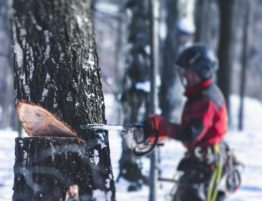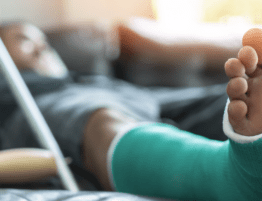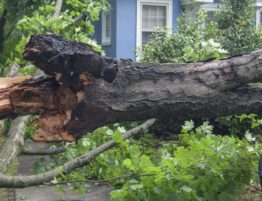
- Even in Louisiana the temperatures can drop to near freezing levels, which can present a number of hazards while you’re working in the cold.
- Each person’s body reacts differently to difficult weather conditions, but some of the most common early symptoms of an adverse reaction to cold weather are fatigue, shivering, slurred speech and bluish skin.
- Don’t try to “tough it out” — dress appropriately for the weather conditions.
- Take occasional breaks from work to allow yourself a moment to get to a heated area and raise your body temperature.
Although Louisiana doesn’t see heavy snow or blizzards, there are still dangers posed to outside workers during this time of year. As all natives know, you can’t just look at a thermometer to know how cold it will feel when you have to conduct outdoor work activities. Unique weather patterns factor in tremendously in how cold it truly feels and how it can affect you from November through February in our fine state.
Winter Dangers for Outdoor Workers
Potential dangerous situations await outdoor workers if you don’t stay alert and aware of your surroundings during the coldest days of winter. Remember, even in Louisiana the temperatures can drop to near freezing levels, which can present a number of hazards while you’re working in the cold. It’s important to keep an eye out for:
- Wind chill temperature – The higher the wind speed, the colder you will feel. This wind chill “factor” is considered to be the air temperature that your exposed skin would feel based on a combination of the temperature and wind speed. Louisiana’s winters can create a lower wind chill temperature that leaves you feeling uncomfortably cold while on the job. Wind chill safety is extremely important.
- Humidity – Louisiana’s high level of humidity contributes to the summer’s stifling heat, but it also makes for a colder winter as well. If you try to judge the weather based solely on the reported temperature, it could leave you exposed to a much colder environment than expected.
- Rain, hail and ice – Down south, snowfall is an extremely rare occurrence. However, ice and rain are more likely and can pose dangerous circumstances for outdoor workers. The risk of slips and falls increases from rain that freezes on sidewalks, roads and roofs, leading to potentially serious injuries.
- Cold stress – Cold, wet environments can cause serious illnesses and injuries that have long-lasting health complications, such as hypothermia and frostbite. While the chances of this aren’t nearly as great as other climates, it’s still important to keep in mind.
Warning Signs of Negative Effects from the Cold
Each person’s body reacts differently to difficult weather conditions, but some of the most common early symptoms of an adverse reaction to cold weather are:
- Extreme fatigue
- Chills and shivering
- Slurred and erratic speech
- Awkward, clumsy behavior
- Pale, bluish skin
- Confusion
- Irritability
Tips and Advice to Protect Yourself
Although working in cold conditions can be uncomfortable and dangerous at times, there are steps you can take to minimize cold weather related injuries and illnesses from affecting you while on the job.
- Appropriate clothing – Don’t try to “tough it out” by not dressing appropriately for the weather conditions. Additionally, multiple layers of clothes work much better for maintaining body heat than one heavier article of clothing. For wet weather, make sure that waterproof clothing is worn.
- Boots – Boots should be insulated against the cold and waterproof to protect your feet from the ice and rain. In addition, they should have soles that are skid and slide resistant for better grip and balance on slippery surfaces.
- Take breaks – Take occasional breaks from work to allow yourself a moment to get to a heated area and raise your body temperature.
- Watch what you eat and drink – Avoid caffeine, as it actually hinders the body’s ability to keep itself warm. Instead, drink plenty of warm liquids and opt for hot, calorie-rich dishes (like warm pasta) to help maintain your core temperature throughout the day.
- Hand and head protection – Body heat tends to escape through your extremities, so make sure to wear both head and hand protection while on the job. Gloves also decrease the risk of workplace accidents caused by losing dexterity from overly cold hands.
Although blizzards and other extreme winter conditions are never seen in the south, there are still inherent risks posed for outside workers. With our tips, you’ll be prepared for everything the coldest Louisiana days have to throw your way!









